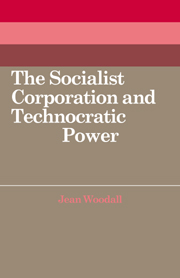 The Socialist Corporation and Technocratic Power
The Socialist Corporation and Technocratic Power Published online by Cambridge University Press: 07 October 2011
The growth in size of the Polish industrial enterprise, and the acquisition of characteristics resembling Western corporations by some levels in the industrial bureaucracy, was chosen as the subject of this work because the author considers that this posed considerable problems for control by a Marxist–Leninist party: the Polish United Workers' Party (PZPR). What would be the implications for PZPR control over management recruitment into these ‘socialist corporations’, and how does the size of these units affect the legitimacy of the PZPR in the eyes of the Polish industrial working class? More broadly this raises the question of what particular forces in the Polish industrialisation process have led to these quasicorporate structures: what are the political consequences of the pursuit of economic growth and in what manner has state bureaucratic power increased; is there an inevitable logic underlying the unfolding of the division of labour; are the ‘forces of production’ ideologically neutral? While conventional theoretical examinations of Communist polities are seen as inadequate to the task of answering these questions, the author feels that the more ‘glamorous’ theories of convergence and industrial/post-industrial society do not fit the bill much better. Rather, in the course of this chapter such ‘grand’ theory will be eschewed in favour of a more eclectic cluster of points, raised in the work of West European industrial sociologists and East European dissident intellectuals, which seem more germane to the major themes of this book.
To save this book to your Kindle, first ensure [email protected] is added to your Approved Personal Document E-mail List under your Personal Document Settings on the Manage Your Content and Devices page of your Amazon account. Then enter the ‘name’ part of your Kindle email address below. Find out more about saving to your Kindle.
Note you can select to save to either the @free.kindle.com or @kindle.com variations. ‘@free.kindle.com’ emails are free but can only be saved to your device when it is connected to wi-fi. ‘@kindle.com’ emails can be delivered even when you are not connected to wi-fi, but note that service fees apply.
Find out more about the Kindle Personal Document Service.
To save content items to your account, please confirm that you agree to abide by our usage policies. If this is the first time you use this feature, you will be asked to authorise Cambridge Core to connect with your account. Find out more about saving content to Dropbox.
To save content items to your account, please confirm that you agree to abide by our usage policies. If this is the first time you use this feature, you will be asked to authorise Cambridge Core to connect with your account. Find out more about saving content to Google Drive.